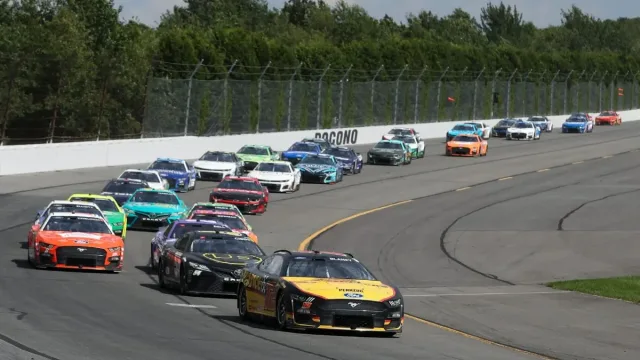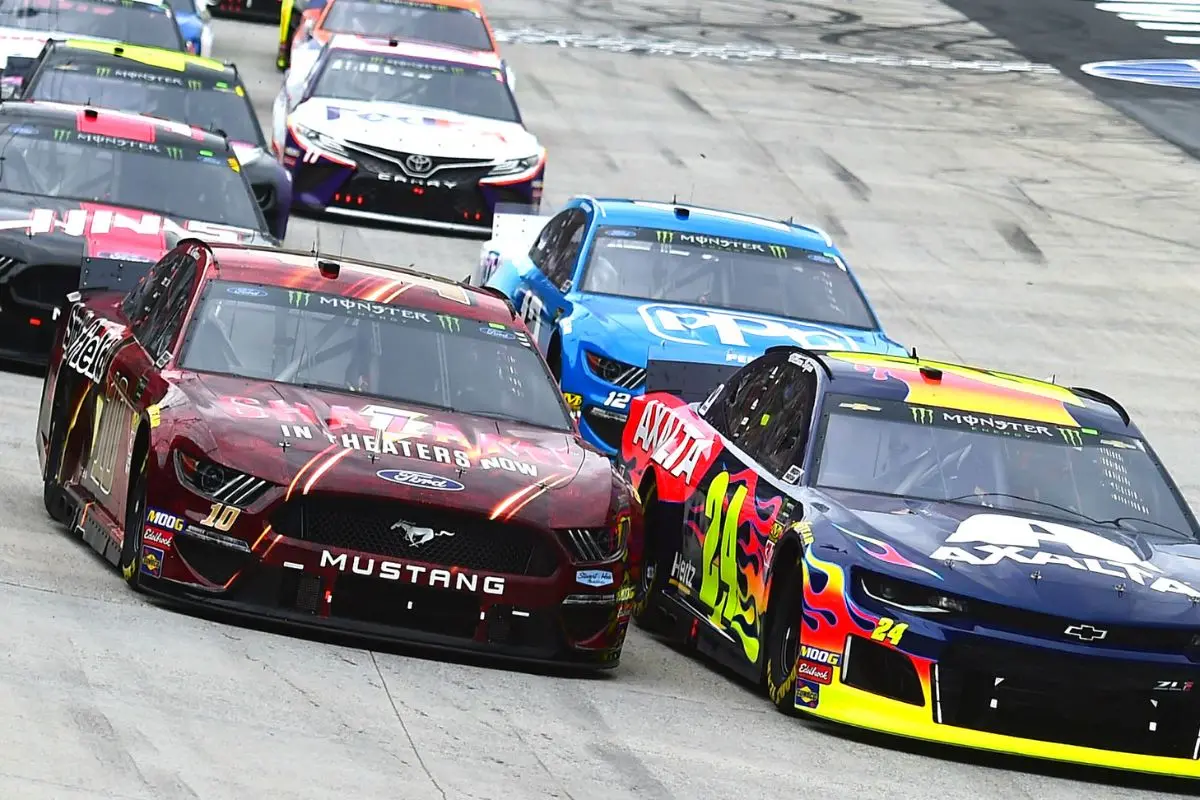NASCAR’s Biggest Title Defense Failures: Winning a championship is hard enough, but defending it is an even bigger challenge. Many past champions have faced unexpected struggles when trying to repeat their success. From Jimmie Johnson’s unmatched streak to Joey Logano’s shocking playoff exit, title defenses often don’t go as planned.
Key Highlights
- Brad Keselowski’s 2013 title defense faltered with a manufacturer switch to Ford, resulting in a 14th place finish and missing the playoffs.
- Jimmie Johnson’s 2011 season saw a decline with only 2 wins and a 6th place finish, ending his five-year championship streak.
- Kurt Busch’s 2005 title defense was marred by an off-track incident leading to suspension and a 10th place finish overall.
- The difficulty of maintaining consistent performance in NASCAR makes title defenses challenging and often unpredictable, as seen with past champions.
- Historical patterns show even dominant champions like Logano and Busch struggle with consecutive title defenses due to relentless competition.
Title Defenses in NASCAR
In NASCAR, where the roar of engines and the thrill of competition dominate, the challenge of defending a NASCAR Cup Series title stands as a demonstration of a driver’s skill and resilience. Achieving this feat is a proof of a driver’s ability to not only conquer the grueling demands of a season but also to adapt swiftly to the constantly changing dynamics of the sport. Historically, only 17 drivers have successfully defended their titles, highlighting the rarity and difficulty of this accomplishment.
The path to consecutive championships is fraught with unpredictability, as evidenced by the illustrious yet challenging careers of many NASCAR champions. Jimmie Johnson‘s unprecedented five consecutive titles from 2006 to 2010 remain a benchmark of excellence and consistency. His success highlights the rare synergy between driver, team, and machinery required for such dominance.
However, not every champion’s subsequent season unfolds with comparable success. Take, for instance, Joey Logano‘s 2023 campaign. Following his second Cup Series championship, Logano’s title defense was abruptly halted, as he faced an unexpected elimination in the initial playoff round.
Likewise, Kyle Busch‘s 2020 season, post his second Cup title, was marked by a conspicuous struggle, failing to secure a win until the 34th race. These examples punctuate the volatile nature of title defenses in NASCAR, where former champions grapple with heightened expectations, relentless competition, and the inevitable strain to replicate past glory.
Jimmie Johnson, 2011
Jimmie Johnson’s 2011 season stands as a demonstration to the unpredictability that accompanies a title defense in NASCAR. After an exceptional stretch of dominance from 2006-2010, where Johnson captured five consecutive NASCAR Cup Series championships, the 2011 season revealed the challenges even the most successful drivers face in maintaining supremacy. Despite his formidable reputation and the backing of Hendrick Motorsports, Johnson’s performance fell short of expectations, highlighting the volatile nature of the sport.
In 2011, Johnson’s tally was modest by his standards: two victories, 14 top-five finishes, and 21 top-10s. These results were insufficient to maintain his stranglehold on the championship, culminating in a sixth-place finish in the points standings. The following table provides a snapshot of Johnson’s 2011 performance:
Johnson’s failure to secure a sixth straight title was not just a personal setback but a reflection of the competitive nature of NASCAR. Tony Stewart’s success in the #14 Stewart-Haas Racing Chevrolet signaled the end of Johnson’s half-decade reign, emphasizing the relentless pursuit of excellence required to stay at the pinnacle.
However, Johnson’s legacy remains intact; his subsequent victories in 2013 and 2016 solidified his status alongside NASCAR legends Richard Petty and Dale Earnhardt, exemplifying resilience and the ability to rebound from adversity.
Brad Keselowski, 2013
Following his victory in the 2012 NASCAR Cup Series, Brad Keselowski faced a challenging title defense in 2013 that illustrated the inherent difficulties of sustaining success at the highest level of motorsport. Shifting from the #2 Team Penske Dodge to the #2 Ford presented its own set of challenges, as Keselowski and his team worked to adapt to new machinery under the Ford banner.
Despite the hurdles, Keselowski highlighted his skill and resilience with a commendable performance, securing 16 top 10 finishes and nine top fives throughout the season.
However, the competitive landscape of NASCAR is unforgiving, and Keselowski’s efforts in 2013 fell short of the high expectations set by his championship-winning campaign. A solitary victory at Charlotte marked a highlight in an otherwise tumultuous season, as consistency eluded him and his team.
Ultimately, Keselowski finished 14th in the points standings, marking his third-worst career finish and missing the playoffs entirely—a stark contrast to his victorious previous year.
Analyzing Keselowski’s 2013 season reveals the complexities of maintaining championship form. The shift to a new manufacturer likely demanded considerable adjustments, both technically and tactically. In the fiercely competitive NASCAR arena, even minor setbacks can have profound impacts.
Yet, Keselowski’s later resurgence—culminating in multiple Championship 4 appearances and a runner-up finish in 2020—underscores his adaptability and relentless pursuit of excellence.
Now co-owner and driver of RFK Racing’s #6 Ford, he continues to utilize his experience, illustrating his enduring commitment to both individual success and the advancement of his team.
Kurt Busch, 2005
Redemption is often elusive in the world of motorsport, and for Kurt Busch, the 2005 NASCAR Cup Series season was an illustration of the challenges of defending a championship title. After a hard-fought battle in 2004, where he narrowly edged out seasoned competitors like Jimmie Johnson and Jeff Gordon, Busch entered the 2005 season with high expectations. However, the title defense proved arduous, and the promise of back-to-back championships dissipated amid unforeseen obstacles.
Driving the #97 Roush Fenway Racing Ford, Busch managed to secure nine top-five finishes and 18 top-ten finishes, ultimately placing 10th in the season standings. Though respectable, these results fell short of the championship-caliber performance expected from the reigning champion. His season was further blemished by an off-track incident involving the police, which led to his suspension for the final two races. This abrupt end to his title defense highlighted the volatile nature of motorsports, where personal and professional challenges can swiftly alter a driver’s path.
In the aftermath of his turbulent 2005 season, Busch shifted to Team Penske, marking the beginning of an itinerant phase in his career. Despite flashes of brilliance, including a fourth-place finish in 2009, he struggled to replicate his early success.
His subsequent moves to Phoenix Racing, Furniture Row Racing, and Stewart-Haas Racing revealed a pattern of adaptation but not quite the dominance once hinted at. Ultimately, Busch’s career, marked by resilience and reinvention, serves as an indication of the unpredictable and relentless demands of NASCAR competition.
News in Brief: NASCAR’s Biggest Title Defense Failures
The unexpected title defense failures of Jimmie Johnson in 2011, Brad Keselowski in 2013, and Kurt Busch in 2005 emphasize the unpredictable nature of NASCAR. Each case highlights the complex interplay of factors such as team dynamics, competitive stress, and evolving race strategies that can derail even the most formidable champions.
These instances serve as compelling reminders of the sport’s inherent uncertainty, offering valuable insights into the challenges that defending champions face in maintaining their dominance.
ALSO READ: NASCAR’s Biggest Names Inducted Into 2025 Hall of Fame as Racing Icons Celebrate Their Legacy



